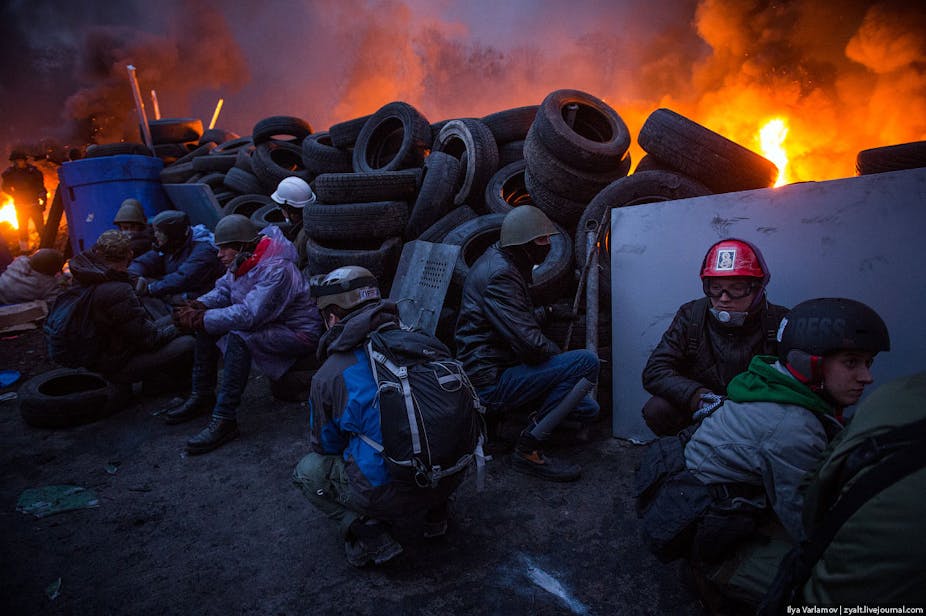Ukraine’s problems have come to a head over the past week as the violence has escalated in Kiev and other major cities. When security forces began using live ammunition against protesters in Independence Square it made even those countries who might think themselves uninvolved in Ukraine’s problems sit up and take notice: witness the USA’s reaction.
After an extraordinary meeting of the EU’s Foreign Affairs Council, the foreign ministers of France, Germany and Poland flew into Kiev on Thursday. What was planned as a piece of lightning diplomacy went on into the night as they tried to broker a deal between the Ukrainian president, Victor Yanukovych, and opposition leaders. The EU’s position on what was needed had been already made clear by the agreement to levy sanctions against Ukraine. Hopes that this would bring even a temporary ceasefire were dashed by the violence that continued to shock the rest of the world.
The deal on Ukraine’s future
Despite an apparent agreement not to make details public, it was soon reported that Yanukovych had agreed to hold presidential elections before the end of the year, to establish a unity government and to set in motion further constitutional changes. Whether this will be enough to satisfy protesters is not yet clear.
But these latest developments constitute a shift in the battle for Ukraine that has so far cost more than 70 lives and injured several hundred people – a battle which has only added to Ukraine’s already deep economic problems. Even supposing the violence comes to an end as a result of the latest diplomacy, Ukraine has a very difficult road to travel in the short to medium term. How and with whom it will make that journey remains very unclear.
Still a choice between East and West
Opinions are divided as to whether we are seeing the beginning of a civil war in Ukraine or whether this is an uprising of the kind seen with the Orange Revolution in 2004. The latter would be less worrying, since it would mean a less protracted fight in which the integrity of the state, at least, should be maintained. But either way, implicitly at least, we are given the impression that Ukraine will make its own decisions – and that any future path will reflect the autonomy flowing from its status as an independent state. But just how true is this?

There are, in fact, plenty of signs that little has really changed since Ukraine gained its independence with the collapse of the Soviet Union in 1991. But in a world fast embracing regionalism, what does independence really mean for a state like Ukraine, whose geography gives it a clear choice between a western-based regionalism in the EU and an eastern one in the Russian-dominated Eurasian Economic Union. Isn’t Ukraine’s choice once again East or West?
The role of external actors, particularly the EU and Russia, has been the focus of much analysis – and it is clear that history will not judge either one well in respect of events in Ukraine. Ultimately, until very recently, Ukraine was faced with making a choice between the immediate financial aid offered by Russia and the longer-term benefits that association with the EU may bring. No doubt the EU would equate this situation to the old saw about the difference between giving a hungry man a fish and teaching that man to fish.
Russia’s actions have, of course, been calculated to sway Ukrainian public and political opinion by sending the message that Russia is fully committed to Ukraine in a way the EU is not. And there is some virtue in that message. The EU has simply failed to give Ukraine the promise (condition-laden though it might have been) of eventual EU membership.
Being an independent sovereign state seemingly used to mean being able to make decisions autonomously. But there is no talk of Ukraine going it alone (although, given the failings of both the EU and Russia, it could be forgiven for wishing to do so). What we are seeing clearly written with the Ukrainian situation is that sovereignty and independence are myths and to talk of them otherwise is folly. Ukraine must still decide between Russia and the EU.
Speaking of spheres of influence as Russia does, has negative connotations. It smacks of imperialism and a righteous belief in the right of one state or entity to have power over others. It is not the same as the EU’s argument that in an alliance of equal states all are dependent on each other in a variety of ways and that co-operation with each other is a logical and practical solution to shared concerns and interests. It is not the same either as setting out rules and standards in respect of that co-operation.
Freedom or repression?
Now even Russia’s bailout looks uncertain. The rating agency Standard and Poor has downgraded Ukraine’s credit rating to triple C, indicating a probable default on its foreign currency dealings. Under those conditions, even if Yanukovych remained in power or was replaced by someone Russian-friendly, Russian money is unlikely to be forthcoming at the same rate and to the same extent. In many ways, that may give the space that Ukraine needs to make a less pressured decision that is based on what it wants to be and look like in the long term rather than one based on a need to solve immediate economic problems.
Ultimately, Ukraine will be better making the choice between East and West based on an assessment of the political rather than economic benefits. That choice is stark and it depends on whether Ukrainians want a future that is relatively free or relatively repressed. To that extent, the world really hasn’t changed.

